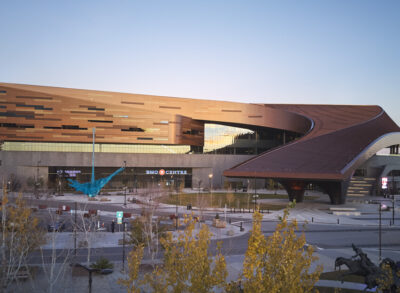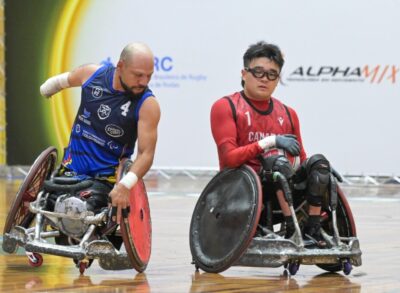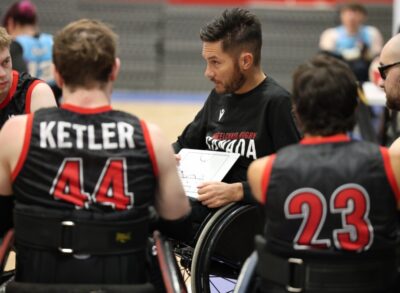Wheelchair Rugby Canada launches Women’s Development Program to advance gender equity in the sport
September 17, 2025Wheelchair Rugby Canada is proud to announce the launch of a Women’s National Development Program, a groundbreaking initiative designed to grow the game, create new opportunities, and pave the path toward a greater gender equity in the sport of wheelchair rugby.

Ottawa, ON — Wheelchair Rugby Canada is proud to announce the launch of a Women’s National Development Program, a groundbreaking initiative designed to grow the game, create new opportunities, and pave the path toward a greater gender equity in the sport of wheelchair rugby.
Led by a passionate group of volunteer coaches, support staff, and athletes, the program builds on years of advocacy and grassroots effort to provide women with the structure, resources, and competition opportunities needed to succeed at the highest levels of the sport. The initiative is spearheaded by national team athlete Melanie Labelle, with Patrice Dagenais, Travis Murao and Kendra Todd serving as coaches of the team, and support staff from across the country.
“The Women’s Development Program is about more than building a team, it’s about building a movement,” said Paul Hunter, CEO of Wheelchair Rugby Canada. “We are committed to lifting women into the spotlight and ensuring they have the support needed to succeed as leaders both on and off the court. We are grateful for the contribution of the volunteers involved in this initiative, who are working tirelessly to make this program a success.”
As part of its next chapter, the Women’s Development Team will travel to Prague, Czechia, in November 2025 to compete at the RugbyMania tournament, competing under the name “Northern Lights”. This historic appearance will mark the first time in wheelchair rugby’s history that a national organization has entered a women’s team in an international mixed-gender competition.
“Canada sending a women’s team to the Wheelchair Rugby Mania tournament in Prague, Czech Republic, is truly groundbreaking. While some teams have previously fielded all-women lineups during tournaments, and women-only competitions have taken place in recent years, this marks the first time in over 45 years of wheelchair rugby history that a women’s team will compete in an international mixed-gender tournament” said Kathy Newman, Chair of the World Wheelchair Rugby Women’s Task Team and Canadian Paralympic Hall of Fame Inductee.
“While there is still significant work ahead to establish a women’s division in the Paralympics, this moment brings us one step closer to that goal. Every member of this team is making history and will inspire future generations of girls and women to be part of this incredible journey”.
The Women’s Development Program will continue to play a pivotal role in advancing opportunities for women globally, with future goals including participation at the 2026 Women’s World Cup in Paris and ongoing advocacy for the establishment of a women’s division at the Paralympic Games.
A Brief Look Into the History of Women in Wheelchair Rugby
Female participation in wheelchair rugby at the international level has historically been limited, reflecting both the demographics of spinal cord injuries and structural barriers within the sport.
Among the first steps for gender equity in the sport came at the Beijing 2008 Paralympic Games, when the IPC mandated that each team’s 12-player roster include at least one woman. While intended to boost representation, there were mixed results, as several teams chose to carry only 11 men rather than select a female athlete. This raised concerns that women were being tokenized instead of earning roster spots on competitive merit.
Progress followed when the classification system was broadened, allowing athletes with a wider range of disabilities to compete. This expansion created new pathways for women and helped bring more diversity into the game. Over the next decade, pioneering athletes like Erika Schmutz (Canada), the first woman to score a Paralympic try (Beijing Paralympic Games, 2008) and Josie Pearson (Great Britain), who became the first woman to represent her country in Paralympic wheelchair rugby, helped prove that women could compete at the highest levels.
Momentum continued to build through the 2010s, with players such as Miranda Biletski (Canada) and Kylie Grimes (Great Britain) raising visibility for women in the sport. Grimes later made history at Tokyo 2020, becoming the first woman to win Paralympic gold in wheelchair rugby. That same Games, Shae Graham became Australia’s first female representative, while other women began to emerge on teams worldwide.
By the Paris 2024 Paralympic Games, female participation had doubled from Tokyo, with eight women competing across the field. Australia broke ground by featuring three women on its roster, an unprecedented number for a single nation.
To further accelerate change, World Wheelchair Rugby introduced a classification incentive in 2025, granting an additional 0.5 point for every female low-point player on-court (i.e athletes classified as 0.5-1.5), and an additional 1.0 point for every female high-point player on-court (athletes classified as 2.0 and above).
In recent years, the Women’s Cup has grown into a global showcase, bringing together more than 40 women from 10 nations in 2023, and WWR has committed to long-term systemic change through its Gender Equity Playbook (2025–2032).
While women still represent a small minority of the sport overall, their presence at the elite level has never been stronger. What began with isolated pioneers has grown into a movement backed by the international federation, leading to greater international visibility, and a rising generation of athletes who are reshaping what representation looks like in wheelchair rugby.
Get Involved
This movement is growing, and you can be part of it. Whether you’re an athlete, coach, volunteer, donor, or fan, your support helps empower the next generation of women in wheelchair rugby.
📩 changethegame@wheelchairrugby.ca
💻 Donate Now | Join the Movement
Media Inquiries:
Georgia Rudolph – Communications and Content Coordinator
grudolph@wheelchairrugby.ca






